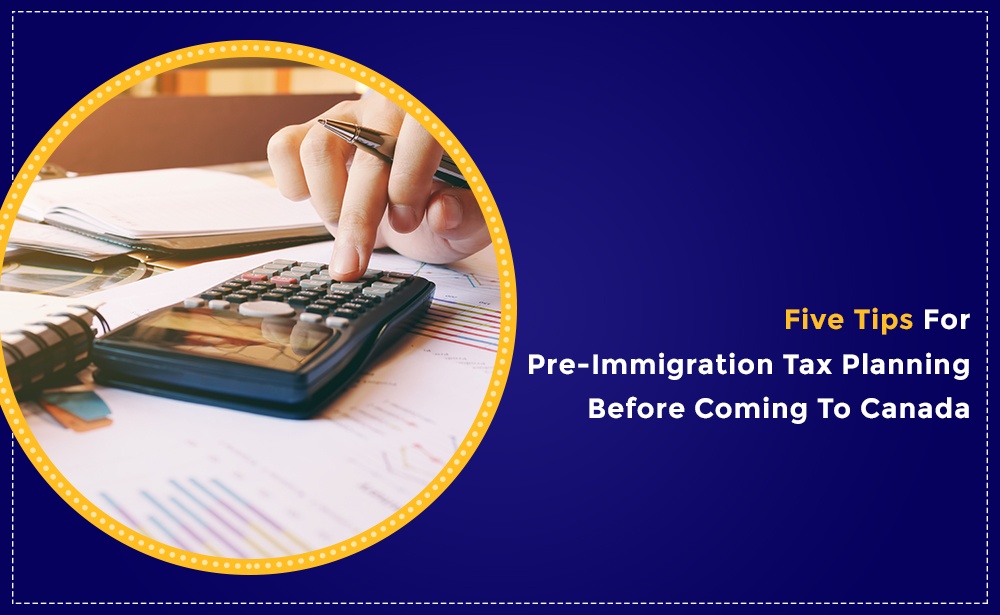Five Tips For Pre-Immigration Tax Planning Before Coming To Canada

Despite the ongoing pandemic, Canada is still the land of opportunity drawing many immigrants from all over the world. However, moving to Canada entails several rules and regulations, especially with taxes. And if you’re a newcomer, it becomes imperative to understand how the country’s tax laws work.
Fortunately for you, the immigration experts at Esquire Canada Immigration and Education want to help you plan your immigration process better so that you can avoid surprises before arriving. Follow these tips that they have outlined below to ensure you have the right pre-immigration tax plan before coming to Canada.
Tip #1: Verify if you’re a non-resident, tax resident, or deemed resident
This is probably the most important point to consider before coming to Canada as the tax treatment is totally different for different statuses. Generally speaking, whether you are a tax resident of Canada depending on your factual situation and the tax treaty between Canada and your current country of residence if there is one. Moreover, there are many myths about the declaration and the hundred and eighty-three-day rule, which is not correct. The best way forward is to consult with our CPA, who is specialized in immigration. They will clear any concerns you may have about your tax residency status.
Tip #2: Make sure to handle your current primary residence
The tax in this area is complex and can have a significant tax implication if you mishandle it. Depending on whether you want to keep the primary residence for personal use or change it as a rental property, there are few options for you to consider before making such a decision. The timing and your expectations about the future housing market are also important factors to go over before determining what the best option is. We can explain the tax implication of each option in detail if you are planning to keep your current principal residence.
Tip #3: Know the different kinds of income are taxed
Unlike many countries, different kinds of income can be taxed differently in Canada, especially if you are expecting to have a lot of investment income after coming to Canada. For example, only 50% of the capital gain is taxable in Canada, but it is only for the gain that you earn after you become tax residence of Canada, except for certain taxable capital property in Canada. Furthermore, different kinds of dividends are taxed differently in Canada, and their tax rates can have a difference of more than 20%. We can provide a customized assessment to discuss the tax implication for each type of income that you are expecting to have after coming to Canada.
Tip #4: Determine the tax credits and savings that you are entitled to
Although there are a lot of taxes in Canada, there are also a lot of tax credits and deductions available to you. Some tax credits like GST tax credit, provincial sale tax credit, and Canada Child Benefit (CCB) are already available to you once you arrive in Canada. Some of the deductions can be used to offset your income in the tax calculations. So, when you know the rules about the tax credits and deductions and how to obtain them, it will definitely save you a lot of taxes in Canada.
Tip #5: Report overseas assets
There is an obligation for tax residents to report worldwide tax in Canada. There is also a requirement to report overseas assets in Canada under several tax forms (For example, Form T1135). Depending on the amount and the type of assets you have overseas, the information required to provide to CRA, the tax authority in Canada, are different. If you have many overseas assets, the time needed to prepare and compile such information can be far more than the time required to prepare the tax return. If you are going to have a lot of assets overseas after coming to Canada, you should contact our CPA to discuss how to disclose such information in your tax return.
For more tips to gather the right information on pre-immigration tax planning, reach out to Esquire Canada Immigration and Education. We have licensed immigration consultants with offices in Hong Kong And Toronto, Canada. Our immigration consultants are licensed and in good standing with the Immigration Consultants of Canada Regulatory Council (ICCRC). We offer necessary support and advice to new immigrants to ensure a smooth transition to Canada.
We serve clients in Hong Kong and Toronto, Mississauga, Hamilton, Brampton, Scarborough, Richmond Hill, Markham in Canada.
To learn more about our immigration services, please click here or get in touch with me by clicking here.